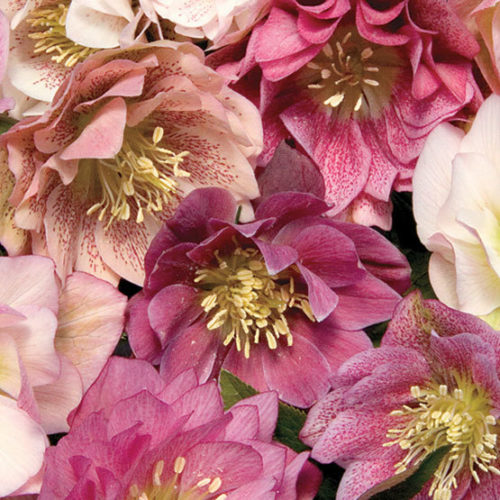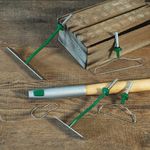
Hellebores begin blooming in mid-winter in a range of colors, adding much needed color very early in the season. They bloom when the temperature is below freezing, even amidst the snow. Protect from cold winter winds, especially when not insulated by snow, to avoid damaged foliage. Avoid ingestion of all plant parts and contact with the sap.
Noteworthy CharacteristicsDouble-flowered, naturalizes well, and comes true from seed
CareBest grown in humus-rich, neutral to alkaline, medium moisture, well-drained soils in part shade to full shade. Prefers light to moderate shade. Tolerant of summer heat and humidity. Cut back flowering stems after bloom to promote new foliage growth. Locate plants in areas protected from cold winter winds.
PropagationAllow it to naturalize, divide after flowering, or sow seeds in containers in a cold frame as soon as ripe.
ProblemsSlugs, snails, aphids, leaf spot, and black rot
Fine Gardening Recommended Products

Planting in a Post-Wild World: Designing Plant Communities for Resilient Landscapes
Fine Gardening receives a commission for items purchased through links on this site, including Amazon Associates and other affiliate advertising programs.

Gardener's Supply Company Summerweight Fabric Plant Cover
Fine Gardening receives a commission for items purchased through links on this site, including Amazon Associates and other affiliate advertising programs.

Johnny’s Selected Seeds Connecta® Cultivation Kit
Fine Gardening receives a commission for items purchased through links on this site, including Amazon Associates and other affiliate advertising programs.
- Genus : Helleborus
- Plant Width : 1 to 3 feet
- Plant Height : 1 to 3 feet
- Zones : 4, 5, 6, 7, 8, 9
- Tolerance : Deer Tolerant, Frost Tolerant
- Bloom Time : Early Spring, Winter
- Maintenance : Low
- Moisture : Medium Moisture
- Growth Rate : Moderate
- Light : Partial Shade
- Plant Type : Perennials
- Flower Color : Pink, White
- Uses : Shade
- Plant Seasonal Interest : Spring Interest
Plant Characteristics are only available to Fine Gardening members
Sign up for a free trial and get instant access to our complete plant guide as well as our entire collection of articles and videos.




























